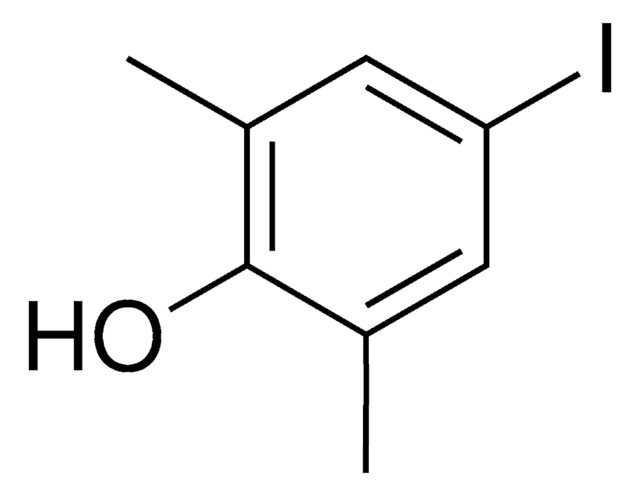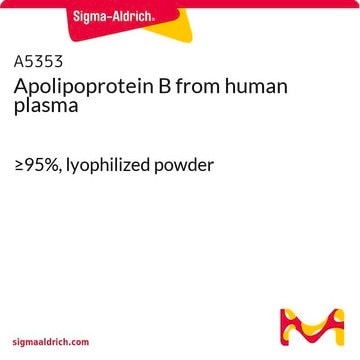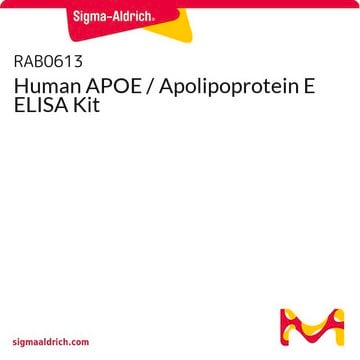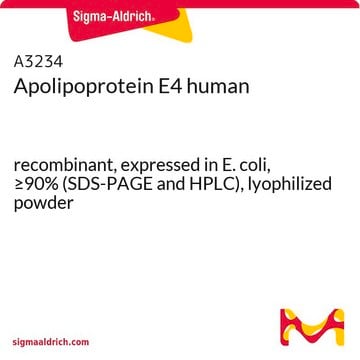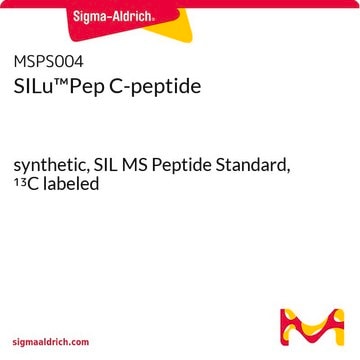ALP70
Apolipoprotein E, human
Szinonimák:
ApoE
Bejelentkezésa Szervezeti és Szerződéses árazás megtekintéséhez
Összes fotó(1)
About This Item
UNSPSC kód:
12352202
eCl@ss:
32160405
NACRES:
NA.41
Javasolt termékek
biológiai forrás
human
Minőségi szint
Teszt
≤95% (SDS-PAGE)
Forma
liquid
gyártó/kereskedő neve
Chemicon®
koncentráció
0.276 mg/mL
NCBI elérési szám
UniProt elérési szám
Általános leírás
Apolipoprotein E (Apo E) is a multifunctional protein and exists in 3 isoforms namely apoE2, apoE3, and apoE4. It is the constituent of plasma lipoproteins. Apo E is produced by various tissues and is majorly found in interstitial fluid and lymph. It is released in a lipid-poor form.
Alkalmazás
Apolipoprotein E, human has been used as a standard for the quantification of ApoE protein in the sucrose density gradient (SDG) fractions and the unfractionated brain homogenates using an in-house developed sandwich enzyme-linked immunosorbent assay (ELISA). It has also been used in western blotting to assess its exogenous effects on low-density lipoprotein (LDL)-heparin interactions.
Biokémiai/fiziológiai hatások
Apolipoprotein E (Apo E) serves as a ligand for low-density receptors and participates in the transport and redistribution of cholesterol and other lipids. It is thought to be involved in tissue repair as increased amounts of the protein are found at sites or peripheral nerve injury and regeneration. A mutant form is associated with type III hyperlipoproteinemia. Apo E plays a crucial role in neurobiology and neurodegenerative diseases.
Fizikai forma
Liquid in 10 mM NH4HCO3, pH 8.0.
Jogi információk
CHEMICON is a registered trademark of Merck KGaA, Darmstadt, Germany
Tárolási osztály kódja
12 - Non Combustible Liquids
WGK
WGK 2
Lobbanási pont (F)
Not applicable
Lobbanási pont (C)
Not applicable
Analitikai tanúsítványok (COA)
Analitikai tanúsítványok (COA) keresése a termék sarzs-/tételszámának megadásával. A sarzs- és tételszámok a termék címkéjén találhatók, a „Lot” vagy „Batch” szavak után.
Már rendelkezik ezzel a termékkel?
Az Ön által nemrégiben megvásárolt termékekre vonatkozó dokumentumokat a Dokumentumtárban találja.
Paul S Hauser et al.
Progress in lipid research, 50(1), 62-74 (2010-09-22)
Apolipoprotein (apo) E has a storied history as a lipid transport protein. The integral association between cholesterol homeostasis and lipoprotein clearance from circulation are intimately related to apoE's function as a ligand for cell-surface receptors of the low-density lipoprotein receptor
Yadong Huang et al.
Neurobiology of disease, 72 Pt A, 3-12 (2014-09-01)
Apolipoprotein (apo) E is a multifunctional protein with central roles in lipid metabolism, neurobiology, and neurodegenerative diseases. It has three major isoforms (apoE2, apoE3, and apoE4) with different effects on lipid and neuronal homeostasis. A major function of apoE is
Zaili Yang et al.
Journal of virology, 90(21), 9632-9643 (2016-08-19)
Hepatitis C virus (HCV) is a major cause of chronic liver disease, infecting approximately 170 million people worldwide. HCV assembly is tightly associated with the lipoprotein pathway. Exchangeable apolipoprotein E (apoE) is incorporated on infectious HCV virions and is important
Erica Lana et al.
Frontiers in molecular neuroscience, 12, 176-176 (2019-08-17)
Background: A fundamental question in Alzheimer's disease (AD) is whether amyloid-β (Aβ) peptides and their deposition in the brain signify a direct pathological role or they are mere outcome of the disease pathophysiological events affecting neuronal function. It is therefore
Shobini Jayaraman et al.
Biochimica et biophysica acta. Molecular and cell biology of lipids, 1865(8), 158712-158712 (2020-04-15)
Low-density lipoprotein (LDL) binding to arterial proteoglycans initiates LDL retention and modification in the arterial wall, triggering atherosclerosis. The details of this binding, its effectors, and its ramifications are incompletely understood. We combined heparin affinity chromatography with biochemical, spectroscopic and
Tudóscsoportunk valamennyi kutatási területen rendelkezik tapasztalattal, beleértve az élettudományt, az anyagtudományt, a kémiai szintézist, a kromatográfiát, az analitikát és még sok más területet.
Lépjen kapcsolatba a szaktanácsadással